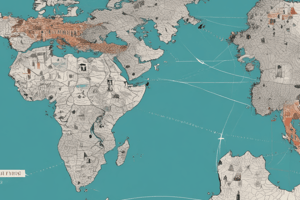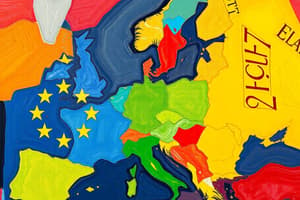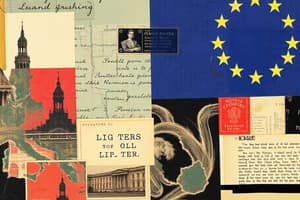Podcast
Questions and Answers
What is a key requirement in combating terrorism and organized crime in the EU?
What is a key requirement in combating terrorism and organized crime in the EU?
- Increased immigration restrictions
- Decentralized policing efforts
- Isolation from non-EU countries
- Collaboration among EU police forces (correct)
Since when has the EU focused on joint solutions for asylum and immigration?
Since when has the EU focused on joint solutions for asylum and immigration?
- 2015 (correct)
- 2005
- 2010
- 2020
What event has led to unprecedented waves of refugees to Europe?
What event has led to unprecedented waves of refugees to Europe?
- Wars, dictatorships, and hunger (correct)
- Economic growth in the EU
- Natural disasters
- International trade agreements
What type of crime necessitates closer police cooperation within the EU?
What type of crime necessitates closer police cooperation within the EU?
What has been a significant challenge for the EU related to immigration since 2015?
What has been a significant challenge for the EU related to immigration since 2015?
What political stance do they often take in relation to EU institutions?
What political stance do they often take in relation to EU institutions?
What is a common viewpoint held by those who vote in opposition to the majority political line in the EU?
What is a common viewpoint held by those who vote in opposition to the majority political line in the EU?
Which event marked the beginning of a worldwide financial and economic crisis?
Which event marked the beginning of a worldwide financial and economic crisis?
What is one of the main goals of the EU regarding justice?
What is one of the main goals of the EU regarding justice?
What is a requirement for achieving the EU’s justice goals?
What is a requirement for achieving the EU’s justice goals?
How would you characterize their stance on immigration?
How would you characterize their stance on immigration?
Which of the following statements best describes their political behavior within the EU?
Which of the following statements best describes their political behavior within the EU?
What does the EU aim to ensure regarding legal protection?
What does the EU aim to ensure regarding legal protection?
Which of the following best describes the nature of the challenges faced by the EU in making justice accessible?
Which of the following best describes the nature of the challenges faced by the EU in making justice accessible?
Which of the following is NOT a focus area of the EU in relation to justice?
Which of the following is NOT a focus area of the EU in relation to justice?
What was the primary focus of the EU during the legislative period 2014-2019?
What was the primary focus of the EU during the legislative period 2014-2019?
During the legislative period 2014-2019, how many new countries were set to join the EU?
During the legislative period 2014-2019, how many new countries were set to join the EU?
Which of the following was NOT a reason for the lack of new countries joining the EU from 2014 to 2019?
Which of the following was NOT a reason for the lack of new countries joining the EU from 2014 to 2019?
What was the impact of the EU's focus on economic growth during the legislative period?
What was the impact of the EU's focus on economic growth during the legislative period?
Which of the following best describes the EU's strategy in 2014-2019 regarding new memberships?
Which of the following best describes the EU's strategy in 2014-2019 regarding new memberships?
How many judges are there in the Court of Justice of the European Union?
How many judges are there in the Court of Justice of the European Union?
What is the role of the advocates-general in the Court of Justice of the European Union?
What is the role of the advocates-general in the Court of Justice of the European Union?
Where is the Court of Justice of the European Union located?
Where is the Court of Justice of the European Union located?
How many advocates-general assist the judges in the Court of Justice of the European Union?
How many advocates-general assist the judges in the Court of Justice of the European Union?
Which of the following statements is true regarding the composition of the Court of Justice of the European Union?
Which of the following statements is true regarding the composition of the Court of Justice of the European Union?
What was one of the main goals of the reforms in banking and financial institutions?
What was one of the main goals of the reforms in banking and financial institutions?
What structural change supported the reform of banks and financial institutions?
What structural change supported the reform of banks and financial institutions?
Which of the following was NOT a focus of the reforms made to banks and financial institutions?
Which of the following was NOT a focus of the reforms made to banks and financial institutions?
Which of these best describes the expected outcome of creating a banking union?
Which of these best describes the expected outcome of creating a banking union?
How did the reaction to financial issues influence banking reforms?
How did the reaction to financial issues influence banking reforms?
Flashcards
EU police cooperation
EU police cooperation
Police forces from all EU countries collaborating together to combat terrorism and organized crime.
EU asylum and immigration challenges
EU asylum and immigration challenges
Challenges faced by the EU due to a large number of refugees seeking safety from war, oppression, and famine.
Joint European solutions for asylum and immigration
Joint European solutions for asylum and immigration
The EU's priority to find shared solutions to handle the growing number of refugees seeking asylum in Europe.
EU asylum and immigration agenda since 2015
EU asylum and immigration agenda since 2015
Signup and view all the flashcards
Reasons for refugee waves in Europe
Reasons for refugee waves in Europe
Signup and view all the flashcards
Area of freedom, security, and justice
Area of freedom, security, and justice
Signup and view all the flashcards
Close cooperation between EU governments
Close cooperation between EU governments
Signup and view all the flashcards
New challenges for the EU
New challenges for the EU
Signup and view all the flashcards
Equal access to justice
Equal access to justice
Signup and view all the flashcards
Equal protection by the law
Equal protection by the law
Signup and view all the flashcards
EU Opposition Groups
EU Opposition Groups
Signup and view all the flashcards
Sceptical on EU Integration
Sceptical on EU Integration
Signup and view all the flashcards
2008 Financial Crisis
2008 Financial Crisis
Signup and view all the flashcards
EU Immigration Policy Criticisms
EU Immigration Policy Criticisms
Signup and view all the flashcards
EU Focus During 2014-2019
EU Focus During 2014-2019
Signup and view all the flashcards
EU Expansion Pause
EU Expansion Pause
Signup and view all the flashcards
EU Internal Focus
EU Internal Focus
Signup and view all the flashcards
EU Consolidation Phase
EU Consolidation Phase
Signup and view all the flashcards
EU's Economic Growth
EU's Economic Growth
Signup and view all the flashcards
Banking Union
Banking Union
Signup and view all the flashcards
Reforming Banks
Reforming Banks
Signup and view all the flashcards
The Subsequent Reaction
The Subsequent Reaction
Signup and view all the flashcards
Banking Regulations
Banking Regulations
Signup and view all the flashcards
Court of Justice of the EU
Court of Justice of the EU
Signup and view all the flashcards
Where is the Court of Justice of the EU located?
Where is the Court of Justice of the EU located?
Signup and view all the flashcards
Advocates-General
Advocates-General
Signup and view all the flashcards
Composition of the Court of Justice
Composition of the Court of Justice
Signup and view all the flashcards
What is the main function of the Court of Justice?
What is the main function of the Court of Justice?
Signup and view all the flashcards
Study Notes
Europe in 12 Lessons
- The European Union aims to maintain and build peace, bring European countries together for practical cooperation, ensure citizens live in security, promote economic and social solidarity, and preserve European identity and diversity in a globalized world.
Why the European Union?
- The idea of a united Europe was a dream shared by philosophers and visionaries.
- Peace was shattered by the terrible wars of the 20th century.
- After World War II, there was a new hope to end international hatred and rivalry.
- Leaders like Robert Schuman, Konrad Adenauer, Alcide De Gasperi and Winston Churchill worked to persuade their peoples to usher in a new era founded on treaties guaranteeing the rule of law and equality.
- Robert Schuman proposed establishing a European Coal and Steel Community.
- Today, peace is a reality in EU countries that respect the rule of law and fundamental rights.
- Former Yugoslavia countries are either in the EU have joined or are preparing to.
- Europe has faced economic and social crisis, and populist, extremist, and nationalistic tendencies threaten democracy.
Twelve Historic Steps
- 1951: The European Coal and Steel Community (ECSC) was established by six founding members.
- 1957: The six countries signed the Treaties of Rome, setting up the European Economic Community (EEC) and the European Atomic Energy Community (Euratom).
- 1973: The Communities expanded to nine members.
- 1979: The first direct elections to the European Parliament.
- 1981: First Mediterranean enlargement.
- 1992: The European single market was created.
- 1993: The Maastricht Treaty established the European Union (EU).
- 2002: The euro came into circulation.
- 2004: The EU had 25 member states, increasing to 28 by 2013.
- 2009: The Treaty of Lisbon revised the EU's decision-making process.
- 2014: European elections took place.
- 2015: Gradual return to moderate economic growth after the financial crisis.
Enlarging the EU and getting on with the neighbours
- The European Union is open to any European country that meets the democratic, political and economic criteria for membership.
- Successive enlargements have increased the EU's membership.
- Six Balkan countries and Turkey are at various stages of preparation for membership.
- Each new treaty requires unanimous approval from all existing EU members.
- Challenges to the EU's neighbourhood policy include Russian policy and the Syrian/Iraqi crisis, combined with an increase in refugees.
How does the EU work?
- The European Parliament, representing EU citizens, shares legislative and budgetary powers with the Council.
- The EU's Heads of State or Government, as the European Council, set the EU's overall political direction.
- The Council, composed of ministers from EU Member States, make EU laws and policy decisions.
- The European Commission, representing the common interest of the EU, is the main executive body. It proposes and implements EU policies.
- Key EU institutions include the European Parliament, the Council, the European Commission, the Court of Justice, and the European Central Bank.
What does the EU do?
- The EU acts in a wide range of policy areas, including the single market, the euro, promotion of economic growth, security, justice and foreign affairs.
- Other EU activities include innovation policies (climate, environment, protection, research, and energy), and social solidarity (cohesion) policies in regional, agricultural, and social affairs.
- The EU budget funds these policies and complements national governments' actions. The 2017 EU budget was about 1.04% of their combined gross national income.
The single market
- The single market is a major achievement of the EU, eliminating trade restrictions.
- The four freedoms—movement of people, goods, services, and capital—are at the heart of the single market.
- The EU has implemented various policies for the single market's smooth functioning, including transport, competition, legislation.
- The single market is not a fully integrated economy; some sectors, such as services of general interest, are still subject to national laws.
- The financial crisis of 2008 prompted the EU to create a banking union for tighter bank protection, and common oversight.
The Euro
- The euro is the single currency used by 19 of the 28 EU member states, for all transactions including non-cash.
- Adopted in 1999, the euro came into full use in 2002.
- New EU Member States are expected to adopt the euro when they meet the convergence criteria.
- The euro benefits travelers and shoppers through the avoidance of currency exchange costs and difficulties.
- The stability of the euro was strengthened during the crisis through solidarity instruments helping heavily indebted governments.
Creating investment and growth in the digital economy
- The EU's policy aims to make the European economy competitive, including creating a digital Europe.
- Efforts to revive the economy after the 2008 crisis focused on reducing public debt.
- EU action includes initiatives to increase investment, improve financial markets, and enhance social cohesion.
- Efforts are being made to promote a full digital single market.
What does it mean to be a European citizen?
- EU citizens can travel, live and work anywhere in the EU.
- EU funds education and cultural programs to foster common identity.
- The single currency, flag, and anthem are symbols of shared European identity.
- Citizens vote every five years to elect the European Parliament, which votes on the commission.
A Europe of freedom, security, and justice
- The opening of internal EU borders benefits travelers.
- Cooperation within EU borders is imperative to combat crime, terrorism, illegal immigration and human trafficking.
- EU external border controls and measures to address refugee situations are paramount to maintaining security.
- The EU is fighting international crime and terrorism with Europol and common procedures in civil law.
The EU on the world stage
- The EU speaks with a unified voice in international negotiations.
- The EU maintains a strong presence within international Organizations like the WTO; its trade policies are directed at opening markets and increasing its global presence.
- The EU prioritizes historical and geographical ties, especially in Africa and Middle East.
- The EU uses its economic power ('soft power') for diplomacy, humanitarian aid and development assistance across the world.
What future for Europe?
- Europe must continue to adapt and evolve.
- Challenges requiring solutions include immigration and refugees, unemployment, sustainability of social protection systems, and ethical implications of new technologies.
Studying That Suits You
Use AI to generate personalized quizzes and flashcards to suit your learning preferences.




